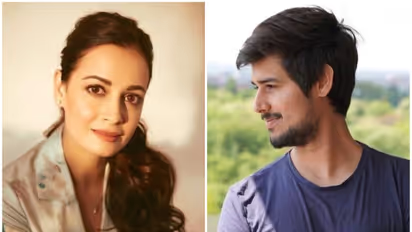Action against Dia Mirza, Dhruv Rathee? Telangana moves court over 'AI' forest visuals in Gachibowli row

Synopsis
The Telangana government has moved court against actor Dia Mirza and YouTuber Dhruv Rathee over alleged AI-generated misinformation about tree felling in Kancha Gachibowli. The case stems from a broader dispute involving deforestation and land ownership near UoH.
The Telangana government's plan to develop 400 acres of land in Kancha Gachibowli, adjacent to the University of Hyderabad (UoH), has ignited significant controversy and legal challenges. Sources in Chief Minister’s office reportedly said that the state government may take action against actor Dia Mirza and YouTuber Dhruv Rathee over posting 'AI' content related to the forest row.
The state asserts ownership of the land and intends to transform it into an IT hub, aiming to bolster technological infrastructure in the region. Conversely, Hyderabad Central University (HCU) students and environmental activists contend that the land is part of the university's territory and emphasize its ecological importance.
Legal actions and allegations of misinformation
In response to escalating protests and widespread dissemination of information opposing the development, the Telangana government filed a petition in the High Court on April 7, 2025. The petition seeks action against individuals allegedly using artificial intelligence (AI)-generated content to spread false narratives about the Kancha Gachibowli project. Chief Minister Revanth Reddy expressed concern that manipulated visuals have misled the public and hindered governmental efforts.
Telangana CMO posted about a high-level review meeting on X, stating that the Telangana government raised serious concerns about what it described as an "artificially created controversy" surrounding the alleged takeover of Hyderabad Central University (HCU) lands. Chief Minister Revanth Reddy, who chaired the meeting, directed officials to urge the courts to order a formal investigation into the spread of AI-generated content related to the Kancha Gachibowli forest row.
The Chief Minister likened the spread of such misleading videos and photos to a "pandemic worse than coronavirus." The government pointed fingers at Union Minister Kishan Reddy, former Minister Jagadish Reddy, YouTuber Dhruv Rathee, and actors including Dia Mirza, John Abraham, and Raveena Tandon, accusing them of sharing AI-manipulated content that allegedly misinformed the public and fueled unrest.
Involvement of public figures
Prominent personalities, including actor Dia Mirza and YouTuber Dhruv Rathee, have publicly opposed the government's plans. Mirza shared visuals depicting tree felling in the area, prompting the government to allege that such content was AI-generated and misleading. Mirza refuted these claims, stating unequivocally that she did not post any AI-generated images or videos.
The Supreme Court intervened on April 3, 2025, taking judicial notice of the deforestation activities in Kancha Gachibowli. The Court directed the Telangana government to immediately halt all tree-felling and excavation activities, underscoring the environmental concerns associated with the development.
Government's position and environmental concerns
While the government maintains that the land is state-owned and earmarked for IT infrastructure development, environmentalists and students argue that the area serves as a vital green lung for Hyderabad. They highlight the potential loss of biodiversity and ecological imbalance that could result from the proposed development.
The Kancha Gachibowli land dispute encapsulates the complex interplay between development objectives and environmental preservation. As legal proceedings continue and public discourse intensifies, the resolution of this issue will likely set a precedent for how similar conflicts are navigated in the future.
Stay updated with the Breaking News Today and Latest News from across India and around the world. Get real-time updates, in-depth analysis, and comprehensive coverage of India News, World News, Indian Defence News, Kerala News, and Karnataka News. From politics to current affairs, follow every major story as it unfolds. Get real-time updates from IMD on major cities weather forecasts, including Rain alerts, Cyclone warnings, and temperature trends. Download the Asianet News Official App from the Android Play Store and iPhone App Store for accurate and timely news updates anytime, anywhere.